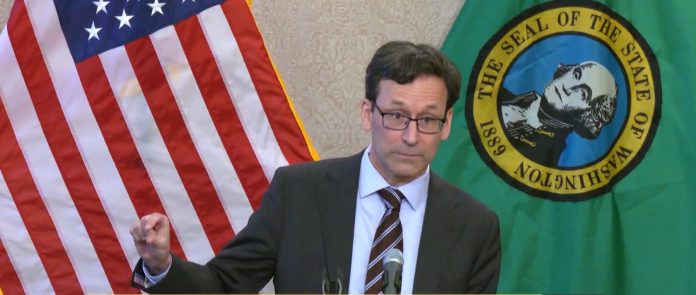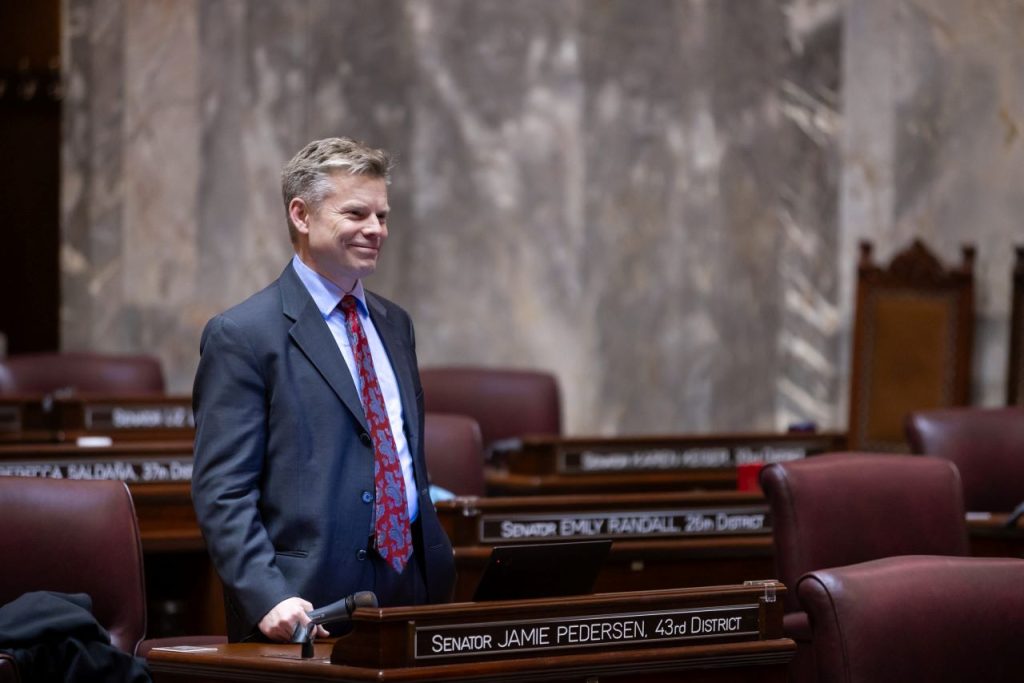
Echoing business leaders, Governor Ferguson wants deeper budget cuts, not new taxes.
Last week the Washington State House and Senate introduced their dueling budget packages, designed to address a four-year budget deficit that could be as high as $16 billion. Both packages take what elected officials are calling a “balanced” approach, addressing the deficit with both cuts and delays to services and new revenue proposals.
However, Governor Bob Ferguson’s reticence to approve new taxes represents a major obstacle to balancing the budget without very deep cuts. In fact, Ferguson announced Tuesday he would veto any budget that included a wealth tax. This represents a more aggressive approach to budget negotiations than typically used by his predecessor, Jay Inslee, who proposed a wealth tax as a budget fix on his way out of office.
Earlier in March, the state received a negative revenue forecast, increasing the projected four-year deficit by about $845 million. The Senate voted out their budget proposal on Saturday with a 28-21 vote on roughly party lines. The House voted out their own proposal on Monday with a 54-44 vote, with five Democrats joining Republicans to vote against it. Now the two chambers will have to negotiate between themselves and with Governor Bob Ferguson to arrive at a final budget proposal.
“We have a brand new governor who hasn’t been through this process before and who approaches these questions pretty differently from his predecessor,” said Senate Majority Floor Leader Jamie Pedersen (D-43rd, Seattle). “And so I think the biggest thing to watch is what he decides and how he wants to go about this discussion.”
Ferguson has proposed about $4 billion in cuts, but has not gotten behind any new revenue proposals. He’s also demanded $100 million for police hiring grants. The governor’s approach leaves the remaining $10 billion hole over the next four years in the lawmakers’ hands without much help from him, but plenty of veto pen rattling.
New revenue on the table
Both the Senate and the House propose different versions of a tax that could be considered a “wealth” tax, which would be paid by about 4,300 of the richest Washingtonians.
The House’s version imposes a $8 tax on every $1,000 of estimated value on certain financial intangible assets such as stocks, bonds, mutual funds and index funds, with the first $50 million in assessed value exempt from the tax. The Senate’s version also affects those with more than $50 million in value, imposing a $10 tax on every $1,000 on the entire amount of assets instead of exempting the first $50 million.
The Senate version of the tax would generate $4 billion annually beginning in fiscal year 2027, about twice as much as the House version due to removing the exemption.
At his Tuesday press conference, Ferguson said that he would not sign a budget that included either version of this tax.
“The legal arguments for the wealth tax are contested. The courts could go either way on that issue,” Ferguson said. “It would be irresponsible to rely on untested new tax and to balance our budget, particularly given the situation we face with the federal government.”
Ferguson did indicate he’d be willing to consider a small wealth tax that would generate no more than $100 million in revenue that could be tested both in the courts and in public opinion. He didn’t mention the possibility of passing a larger wealth tax that the current biennium of the budget wouldn’t depend on but that could bring in a larger amount of revenue for the state in the future should it survive any court challenges.
Ferguson refused to weigh in on any other new revenue proposal.
Both the House and Senate revenue packages include a provision lifting the current 1% cap for annual property tax growth. Washington cities and counties, including King County, have been asking for this cap to be lifted for some years now; with the current cap, local revenues are unable to keep pace with inflation, leading to increasing deficits.
With the property tax cap lifted, King County estimates it will collect an additional $25 million for the 2026-2027 biennium, which it would use to reduce the $150 million deficit it is currently facing.
The Senate and House have competing proposals to tax big businesses.
The Senate’s proposal, a payroll expense tax similar to the JumpStart tax in Seattle, would apply to about 5,289 companies. It would impose a 5% tax on large employers on the amount of payroll expenses above the Social Security threshold — currently $176,100 per year — and would only apply to companies with $7 million or more in annual payroll expenses. It would include a tax credit for those companies already paying Seattle’s JumpStart tax. It is expected to generate $2.3 billion per year once fully implemented.
The House’s proposal, a business and operations (B&O) tax, has two parts. It would impose a 1% B&O tax surcharge on businesses with taxable income over $250 million, which would impact around 400 businesses. It would also impose an increase to the surcharge on specified financial institutions with a net income of $1 billion or more, from 1.2% to 1.9%. It is expected to generate $2 billion per year once fully implemented.
The House’s B&O tax proposal contains an exemption to any income subject to the state’s manufacturing tax rates, which means companies like Boeing wouldn’t be paying the tax.
Rep. Shaun Scott (D-43rd, Seattle) objected to the Boeing exemption. A socialist-leaning Democrat in the Bernie Sanders mold, Scott is in his first year in office after winning election last November, backed by a broad progressive coalition that included The Urbanist Elections Committee.
“[It] cuts the amount of revenue that will be raised practically in half,” Scott said. “You’re talking about two and a half billion dollars worth of revenue that the state is prepared to give over to a corporation that really doesn’t need the money.”

House Majority Leader Joe Fitzgibbon (D-34th, West Seattle) said if Boeing wasn’t exempted, this tax proposal would more than triple its tax rate — in part due to the tax loopholes granted to the company over generations of state leaders that are so generous that they nearly sparked a trade war in 2020.
“At a time when Boeing recovery is pretty fragile, we were not sure it was the right time to propose tripling their taxes,” Fitzgibbon said, referencing the potential of President Donald Trump’s trade wars to harm the state’s manufacturers.
Boeing was recently chosen to build the U.S. Air Force’s next fighter jet with an initial contract of $20 billion.
The Senate is proposing lifting many tax exemptions currently in place that it considers outdated or unnecessary, which would generate around another $1 billion in additional revenue. In an effort to further address the state’s upside down tax code, the Senate is also proposing to lower the state sales tax by 0.5%, which would return some money to everyone’s pockets.
Ferguson said he could not sign either chamber’s budget proposal because “each propose far too much tax.”
“I think that it’s possible to pass all of those revenue bills. There’s a reason why they have been introduced as discrete proposals,” Scott said. “That’s a question of political courage, that’s not a question of feasibility. That’s a question of whether or not or Democratic majorities are going to do the correct thing by Washingtonians in the legislature this year.”
“I hear much more anxiety about the tax bills than I hear about the reductions proposed in either the House or Senate budgets,” Fitzgibbon said, arguing that meant the budget cuts had been well-crafted and done “responsibly.”
The Seattle Metropolitan Chamber of Commerce sent a letter opposing new taxation: “We urge House and Senate Democrats to go back to the drawing board and develop a solution that prioritizes fiscal discipline over harmful new taxes.”

A letter signed by 68 local elected officials, including King County Councilmembers Girmay Zahilay, Teresa Mosqueda, Rod Dembowski, and Jorge Barón and Seattle Councilmembers Alexis Mercedes Rinck and Dan Strauss, urged the governor and state legislature to pass new revenue measures.
“As local elected officials from across the state, we know firsthand how our regressive and outdated tax code hampers our ability to serve our constituents. Our tax code hasn’t been significantly updated in 100 years,” the letter reads. “While our statewide population has grown significantly, we are not collecting enough revenue for the investments needed to support our communities and economy, including funding for infrastructure, housing and human services, public health, and public safety, to name a few.”
The letter goes on to express support for lifting the 1% property tax cap and giving local authority for a public safety sales tax, as well as supporting the wealth tax, the payroll tax, and the B&O tax discussed above.
“I think what we felt was that by going a little bit bigger in terms of revenue, we could actually feel really happy and proud of tackling some of the larger systemic problems, rather than just holding everything together with chewing gum and bailing wire and hoping to skate on to the next session,” Pedersen said about the Senate’s revenue package.
Cuts, delays, and furloughs
In spite of proposing bold new revenue packages, both the House and Senate budgets contain many cuts and delays to services.
There was consensus between the chambers about delaying expansions of child care subsidies and other Fair Start for Kids programs. The Senate budget invests about $1 billion more in K-12 education than the House budget, although both budgets increase these investments. Meanwhile, the House budget does more to safeguard health care.
The Senate proposal features a scaled-down version of Ferguson’s plan to furlough certain state workers to save money, suggesting one furlough day per month like Ferguson but for a duration of one year instead of two. Pedersen said this proposal would provide state workers with basically flat compensation for one year, followed by a significant increase in the second year.
“Given the situation that we’re facing in terms of the budget, that seemed like a reasonable proposal to me to help us with our immediate cash crunch that we’re experiencing in the first fiscal year of the four that are part of the budget outlook,” Pedersen said.

The House proposal doesn’t rely on any state worker furloughs. Instead they focused on looking for those state agencies with underspent budgets, as well as finding administrative efficiencies and cutting travel, professional development, equipment, and service contract budgets.
“Our perspective on furloughs was heavily shaped by the furloughs that were enacted during the Great Recession, and we think that the budgetary savings from furloughs are relatively small compared to the impacts on public services, and that sort of stretching state employees even thinner has a direct impact on the services that the public receives from state government,” Fitzgibbon said.
At his press conference this week, Ferguson reiterated that he hasn’t shifted his stance on furloughs.
Meanwhile, hospitals in Washington could be looking at cuts of between $58 million (the House proposal) and $341 million (the Senate proposal) in state assistance, even while they’re still struggling to recover from the initial slam of the Covid pandemic and bracing for potential federal cuts to Medicaid. Smaller and more rural hospitals and medical centers would likely be more heavily impacted by any funding cuts.
Other proposed cuts include reducing the eligibility of Washington college grants, raising college tuition, and closing a women’s prison in Belfair.
“There’s no budget reduction option that is without impact to somebody. There’s no tax increase that is without impact to somebody. The approach that we took, which we have been saying for months that we would take, is a balanced approach,” Fitzgibbon said.
But not all elected officials agree with this approach.
“I think there are a lot of people that are wondering why it is that a state that has strong democratic trifecta is going down the same road as the Trump administration with respect to rolling back basic services,” Scott said.
Ferguson made headlines when he said earlier this year that he wouldn’t sign a budget that didn’t include $100 million over two years for police hiring grants. The Senate proposal doesn’t include any money for this purpose, while the House proposal provides $50 million over four years, with another $50 million over four years for the community reinvestment program, which supports economic development, reentry services, legal assistance, and violence prevention.
Fitzgibbon said when considering public safety, they wanted to look at root causes and prevention as well as understaffing in law enforcement. The House is also interested in making it easier for local governments to implement an increase to the sales tax for criminal justice purposes.
“I think we felt like that [sales tax] was a more sustainable solution to funding for public safety, and not just law enforcement, but all parts of the components of the public safety system, rather than one time grants for hiring workers who local governments may not have the revenue to keep on board after those grants go away,” Fitzgibbon said.

Ferguson, however, said he’ll stand by the ultimatum he set and will veto any budget that doesn’t include his requested investment in police hiring grants.
While Democrats do hold just over 60% of the seats in each chamber, they do not hold a veto-proof majority, which requires a two-thirds vote in Washington state.
The impact of the Trump administration on the state budget
The state receives about $43 billion in federal funding every year (about 20% of the total budget), with $34 billion for Medicaid alone. Democrats in Olympia seem to be in agreement over the threat that the Trump administration poses to the state, whether through weakening civil rights or making deep cuts to essential government services. But they don’t necessarily agree on the best response.
The Senate budget proposal includes using more than $1.6 billion of the state’s rainy day fund to cover expenses in the first year, with a plan to build the fund back up by the end of fiscal year 2027. The House proposal does not use these funds.
“Look, it’s raining right now,” Pedersen said. “If the choice is feeling proud of ourselves for having money in the piggy bank but cutting off vulnerable people from services, I’d rather spend the money out of the piggy bank knowing that we have a plan to replenish the piggy bank, and that’s what our budget does.”
Fitzgibbon sees keeping the rainy day fund intact as a hedge against potential greater federal harms. “If [Congress does] actually do Medicaid cuts, we may have to come back in special session to deal with them,” he said.
Ferguson also wants to preserve the rainy day fund, saying that’s one of the things he needs to see in order to sign the final budget. He emphasized how maintaining the state’s AAA credit rating, which the rainy day fund helps to do, can help the state through uncertainty around federal dollars.
“Our values are being challenged by the Trump administration right now, as we speak in real time,” Ferguson said. “We protect our values by making sure we are not beholden to a federal government that has shown its willingness to use funding to punish organizations and states it disagrees with.”
Ferguson is well known for bringing lawsuits against the federal government during Trump’s first term — 97 in all.
“Hope is not a strategy with Donald Trump, take my word on it,” Ferguson said. “I’m not going to allow the state that I love to be at the financial mercy of Donald Trump and Elon Musk. That is not going to happen. In a challenging financial situation, we must not make it weaker.”
Scott, on the other hand, believes the key to the state protecting its residents from the Trump administration is to pass more revenue bills, and without large corporate exemptions.
“For every big exemption that we end up passing, it’s going to be fewer Department of Health services, fewer behavioral health services, and we’ll just be doing less at a time where [the other] Washington will be doing less…, Because of what’s going on in Washington, DC, people are going to be expecting us to do more,” Scott said.
The legislative session ends on April 27, the deadline by which the House and Senate must reach an agreement on a balanced budget proposal to send to the governor’s desk. Ferguson will then decide whether he will sign the budget or veto it.
“I think if the House and the Senate can remain in solidarity and strong on the revenue question, it makes it a lot harder on the governor’s office to implement the kinds of cuts that they have talked about wanting to see,” Scott said.
Amy Sundberg is the publisher of Notes from the Emerald City, a weekly newsletter on Seattle politics and policy with a particular focus on public safety, police accountability, and the criminal legal system. She also writes science fiction, fantasy, and horror novels. She is particularly fond of Seattle’s parks, where she can often be found walking her little dog.


